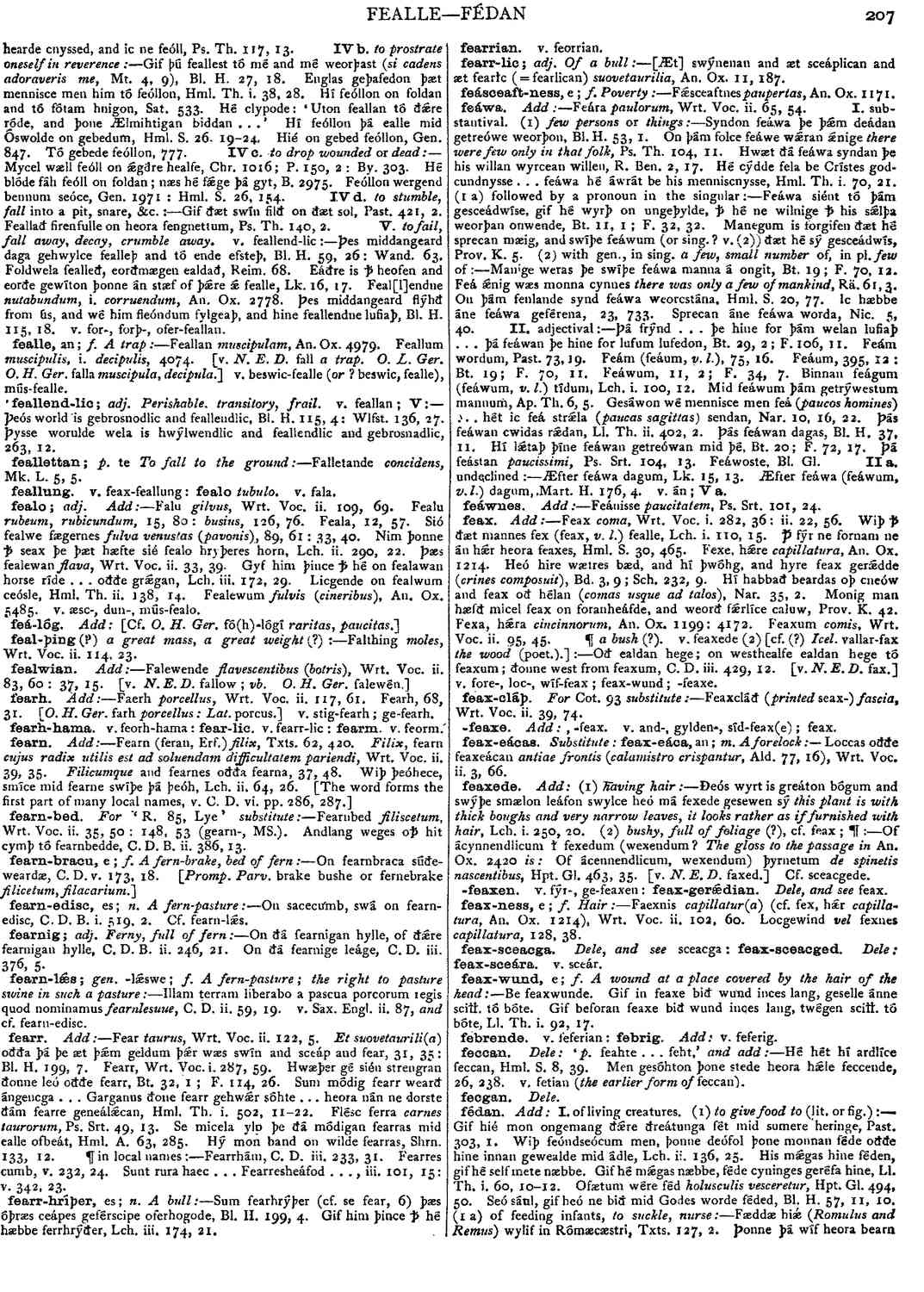feáwa
-
Feára
paulorum,
- Wrt. Voc. ii. 65, 54 .
-
Syndon feáwa þe þǽm deádan getreówe weorþon,
- Bl. H. 53, 1 .
-
On þám folce feáwe wǽran ǽnige
there were few only in that folk,
- Ps. Th. 104, 11 .
-
Hwæt ðá feáwa syndan þe his willan wyrcean willen,
- R. Ben. 2, 17 .
-
Hé cýdde fela be Crístes godcundnysse . . . feáwa hé áwrát be his menniscnysse,
- Hml. Th. i. 70, 21 .
-
Feáwa siént tó þám gesceádwíse, gif hé wyrþ on ungeþylde, ꝥ hé ne wilnige ꝥ his sǽlþa weorþan onwende,
- Bt. 11, 1 ; F. 32, 32.
-
Manegum is forgifen ðæt hé sprecan mæig, and swíþe feáwum (or sing.? v. 2) ðæt hé sý gesceádwís,
- Prov. K. 5.
-
Manige weras þe swíþe feáwa manna á ongit,
- Bt. 19 ;
- F. 70, 12 .
-
Feá ǽnig wæs monna cynnes
there was only a few of mankind,
- Rä. 61, 3.
-
On þám fenlande synd feáwa weorcstána,
- Hml. S. 20, 77 .
-
Ic hæbbe áne feáwa geférena,
- 23, 733 .
-
Sprecan áne feáwa worda,
- Nic. 5, 40 .
-
Þá frýnd . . . þe hine for þám welan lufiaþ . . . þá feáwan þe hine for lufum lufedon,
- Bt. 29, 2 ;
- F. 106, 11 .
-
Feám wordum,
- Past. 73, 19 .
-
Feám (feáum, v. l.),
- 75, 16 .
-
Feáum,
- 395, 12 :
- Bt. 19 ;
- F. 70, 11 .
-
Feáwum,
- 11, 2 ;
- F. 34, 7 .
-
Binnan feágum (feáwum, v. l.) tídum,
- Lch. i. 100, 12 .
-
Mid feáwum þám getrýwestum mannum,
- Ap. Th. 6, 5 .
-
Gesáwon wé mennisce men feá
(paucos homines)
. . . hét ic feá strǽla
(paucas sagittas)
sendan,
- Nar. 10, 16, 22 .
-
Þás feáwan cwidas rǽdan,
- Ll. Th. ii. 402, 2 .
-
Þás feáwan dagas,
- Bl. H. 37, 11 .
-
Hí lǽtaþ þíne feáwan getreówan mid þé,
- Bt. 20 ;
- F. 72, 17 .
-
Þá feástan
paucissimi,
- Ps. Srt. 104, 13 .
-
Feáwoste,
- Bl. Gl .
-
Æfter feáwa dagum,
- Lk. 15, 13.
-
Æfter feáwa (feáwum, v. l.) dagum,
- Mart. H. 176, 4 .
Bosworth, Joseph. “feáwa.” In An Anglo-Saxon Dictionary Online, edited by Thomas Northcote Toller, Christ Sean, and Ondřej Tichy. Prague: Faculty of Arts, Charles University, 2014. https://bosworthtoller.com/44593.
Checked: 1